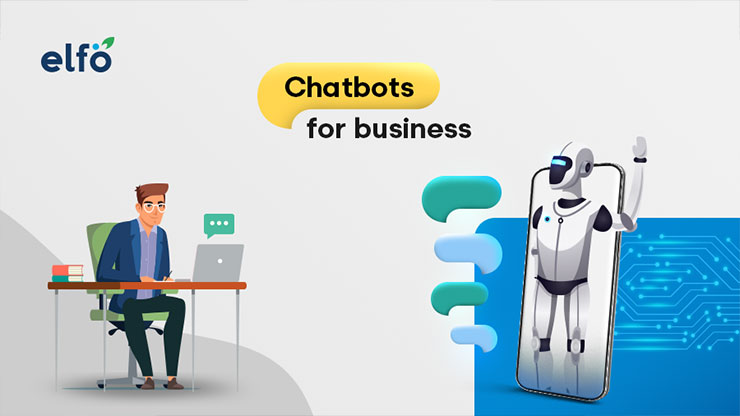
For businesses that want to tap into new markets quickly and reach a larger audience, employing more automation is the most effective way to do so. Machines are constantly evolving and helping man to surpass the constraints of human limitations in current work life. This is true of brands that realize why chatbot is important for improving their businesses.
Today, machines have taken over much of the tedious load from business operations such as data compilation, form filling, etc. If a task can be done repeatedly, why not automate it? With the growing availability of automated machines, it’s become easier for staff to focus on more engaging and creative work, instead of mundane tasks.
This same logic applies to chatbots. No matter whether your business is big or small, chatbots are considered the future of customer service and management. It’s the right time to leverage this kind of technology to level up your customer engagement strategy. Let’s find out how chatbots can help your business make some profitable improvements.
What Is a Chatbot?
A chatbot is an artificial intelligence (AI) program that can simulate a conversation – or a chat, hence its namesake – with a user in real-time through mobile apps or websites. Described as one of the most advanced expressions of interaction between humans and machines, chatbots enable communication via text or audio, which makes them suitable for use on almost all popular messaging apps.
From a technological standpoint, a chatbot represents the next evolutionary stage of a question answering system, leveraging Natural Language Processing (NLP) to formulate responses to questions in the user’s natural language. Chatbots interpret the meaning of written and spoken text and then look up the most relevant information before delivering an answer to the user.
Why Chatbot Is Important for Your Business
Since many people spend a lot of time on their smartphones surfing the Internet, chatbots offer a promising way for businesses to provide improved online services for your customers. They allow companies to boost operational efficiency by enabling a 24/7 automated system, optimized for better performance across different business functions.
1) Customer Service
 Businesses can save costs by upgrading their customer support with AI chatbots. Scale up customer service operations by building an AI chatbot to handle several conversations at a time. Free up your team to only have a live chat with customers when there are questions that the chatbot cannot address.
Businesses can save costs by upgrading their customer support with AI chatbots. Scale up customer service operations by building an AI chatbot to handle several conversations at a time. Free up your team to only have a live chat with customers when there are questions that the chatbot cannot address.
- Website support – Today’s customers don’t waste any time when they have something to ask. They expect a real-time response from online service centres to solve their problems. More businesses are adopting the AI technology of chatbots to screen requests and deliver prompt customer engagement.
- IT helpdesk – Allow your IT team to prioritise fixes by having the chatbot boost your team productivity and drive efficiency in issue identification.
- In-app support – Apps are constantly improving in design and user experience. Have a bot to handle FAQs within your app. It also enables businesses to send personalized notifications to customers to keep them updated on offers.
2) Sales
 Constantly generating qualified leads is not an easy task for many small to mid-sized businesses. With chatbots, you can pre-qualify your leads and automate your sales funnel.
Constantly generating qualified leads is not an easy task for many small to mid-sized businesses. With chatbots, you can pre-qualify your leads and automate your sales funnel.
- Pre-qualify leads – Programming your chatbot with a predefined sales questionnaire, your business can track conversation rates by accurately identifying which website visitors are likely prospects.
- Segment your audience – The chatbot can also help your business identify what are the product interests of website visitors and customers.
- Easy price and feature comparison – If your business sells products and services which are nearly identical to each other, customers may need guidance in selecting the right one, especially if they’re expensive. Chatbots can help customers compare before they buy.
3) Marketing
 It’s no longer viable to just rely on traditional methods of online advertising. They simply don’t work as effectively at grabbing attention in an online marketplace crowded with similar-sounding ads. Support your marketing strategy with a bot that can up-sell and cross-sell your products and services in a personalized and conversational way.
It’s no longer viable to just rely on traditional methods of online advertising. They simply don’t work as effectively at grabbing attention in an online marketplace crowded with similar-sounding ads. Support your marketing strategy with a bot that can up-sell and cross-sell your products and services in a personalized and conversational way.
- Leverage an interactive marketing platform – Improving user experiences on apps and websites, chatbots can give people that friendly push to engage with an offer. For example, you can use chatbots for highly interactive marketing campaigns on social media platforms like Facebook Messenger to reach out to more people at once.
- Product recommendations – With chatbots, you can easily recommend products or special offers based on different touchpoints of the customer journey.
- Actively market content through online interactions – The more you interact with your customers with relevant content, the more business you’re likely to get from them. If you are using online channels to communicate with your customers, you should automate this using chatbots.
Types of Chatbots Available
 However, not all chatbots are created equal. Depending on the technology it uses and resources it has access to, the cost and power of a chatbot will differ. Currently, there are 2 types of chatbots:
However, not all chatbots are created equal. Depending on the technology it uses and resources it has access to, the cost and power of a chatbot will differ. Currently, there are 2 types of chatbots:
1) Command-Based Chatbots
Command-based chatbots follow predefined paths during conversations, tapping into a databank of replies. At each step of the conversation, the user picks from a set of provided options that determine the next step. In turn, the bots can only reply by selecting an answer that matches the context of a query.
Key characteristics of command-based chatbots:
- Interactions with these types of chatbot are highly structured and are most suitable for general customer support functions. It’s easy to use this chatbot to fulfil simple scenarios, such as answering common queries about business hours, delivery status, or tracking details.
- They cannot perform functions outside their code, meaning they cannot create new replies on their own.
- To understand a question in order to answer it, command-based chatbots use template search or dynamic search.
2) AI-based Chatbots
AI-based chatbots are built to answer non-specific questions through machine learning. This means that users can ask whatever questions they want and these chatbots create replies from scratch using NLP. Often referred to as virtual assistants, they are much more interactive and personalized than command-based chatbots.
Key characteristics of AI-based chatbots:
- Learning from user behaviour as a result of previous questions and answers, AI-based chatbots can converse with users in a way humans converse and communicate in real-life situations.
- They apply predictive and sentiment analysis to understand customer emotions closely.
- They understand the context and intent of complex conversations and try to provide more relevant answers.
It’s clear that both types of chatbots have their advantages and disadvantages. Command-based chatbots can give more reliable and grammatically correct answers but they fall short of responding to questions outside their database. On the other hand, AI-based chatbots are more flexible, but they require a vast amount of data to learn from and could take several trials to get their responses right.
Is Chatbot Right for You?
With every new development, we’re heading towards a more connected and digital future. Chatbots in the customer service industry offer businesses the opportunity to improve and grow different aspects of business operations. If you’re a business owner who wants to expand his/her business online, then the time is right to build an AI chatbot.
For any online business today, chatbots can deliver 2 essential benefits – quality product promotions and market presence. With elfoBOT’s solution, you can use our chatbot platform to build the right chatbots to keep your customers engaged in meaningful ways. Not only will this enhance your knowledge base and help your business in developing better products for your clients, but you’ll also be able to offer quicker and more accurate support to customers, enhancing your brand’s reputation.




